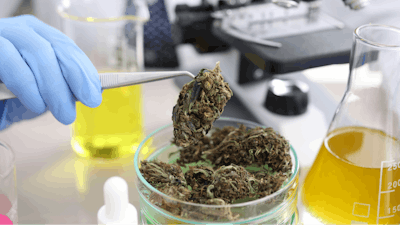
The Oregon Health Authority (OHA) writes rules for cannabis testing that affect both medical and adult-use markets. As of March 1, 2023, the OHA will require new cannabis tests from every operator in the state.
Any cannabis product harvested or manufactured on or after March 1, 2023, will need to be tested for heavy metals and microbiological contaminants in accordance with the new rules.
The OHA issued an FAQ to help alleviate any confusion.
Q: What “heavy metals” are being tested for?
A: The heavy metals compliance test will be looking for arsenic, cadmium, lead and mercury.
Q: What “microbiological contaminants” are being tested for?
A: The microbiological contaminants compliance test will look for pathogenic Aspergillus flavus, A. fumigatus, A. niger and A. terreus, Shiga toxin-producing Escherichia coli and Salmonella species.
Q: Can I composite for microbiological contaminants and heavy metals just like I can composite for pesticides?
A: These tests may be performed on composited samples of marijuana and usable marijuana just like what is allowed under current testing requirements.
Q: What happens when a batch fails for heavy metals?
A: If a sample from a batch of a marijuana, usable marijuana, finished inhalable cannabinoid product or industrial hemp-derived vapor item fails heavy metal testing, the batch may not be remediated and must be destroyed in a manner specified by OHA, the Oregon Liquor and Cannabis Commission (OLCC), or the Oregon Department of Agriculture (ODA).
If a sample from a cannabinoid concentrate or extract fails heavy metal testing, the batch may be remediated using procedures that would reduce the concentration of heavy metals to less than the action level. As a reminder, dilution is not a form of remediation. A batch that is remediated must be re-sampled and re-tested for all required tests.
Q: What happens when a batch fails for microbiological contaminants?
A: If a sample from a batch of marijuana or usable marijuana fails microbiological contaminant testing, the batch may either be remediated using a sterilization process or be used to make a cannabinoid concentrate or extract if the processing method effectively sterilizes the batch, such as a method using a hydrocarbon solvent or CO2 extraction system.
If a sample from a batch of a cannabinoid concentrate, extract, finished inhalable cannabinoid product, or industrial hemp-derived vapor item fails microbiological contaminant testing, the batch may be further processed if the processing method effectively sterilizes the batch, such as a method using a hydrocarbon solvent or CO2 extraction system.
A batch that is remediated through a sterilization process as outlined above must be re-sampled and re-tested for all required tests.
A batch that fails microbiological contaminant testing after undergoing remediation through a sterilization process as outlined above must be destroyed in a manner specified by the OHA or OLCC.
Click here to view a Cannabis Testing Guide.
The testing rules can be found in Chapter 333 Divisions 7 and 64, in full at healtheroregon.org/ommprules.






















